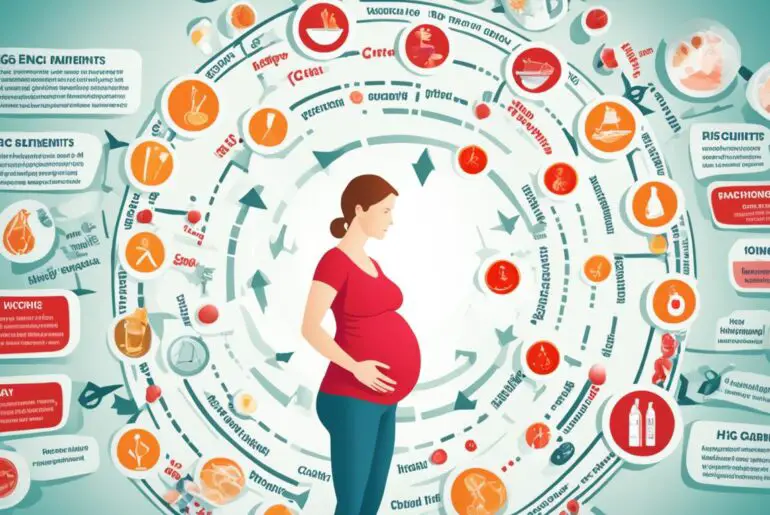Did you know that the HCG diet, a controversial weight loss method, involves consuming only 500 calories a day while receiving daily injections or taking oral forms of the human chorionic gonadotropin (hCG) hormone? This hormone is naturally produced during pregnancy and is used to treat fertility issues. However, the FDA has not approved hCG for weight loss purposes. It is important to note that losing weight during pregnancy is not advisable, and the HCG diet should be avoided if you are trying to conceive.
Key Takeaways:
- The HCG diet restricts calorie intake to a very low level, but its safety and effectiveness are highly debated.
- The FDA has warned against using over-the-counter HCG products for weight loss as they have not been proven safe or effective.
- Losing weight during pregnancy is not recommended, and seeking professional guidance for safe weight management is crucial.
- HCG diet before pregnancy may be used to increase fertility, but it should be discontinued if planning to conceive.
- Risks and side effects of the HCG diet include nutrient deficiencies, gallstone formation, and irregular heartbeat.
Understanding the HCG Diet and Its Safety
The HCG diet is a popular weight loss method that involves severely restricting calorie intake to a very low level. The main principle of the HCG diet is the use of the human chorionic gonadotropin (hCG) hormone, which is either administered through daily injections or taken orally. However, the safety and effectiveness of the HCG diet have been a subject of intense debate.
The HCG diet restricts calorie intake to a very low level, which can lead to weight loss. However, there are significant concerns regarding the safety of this approach.
The FDA has issued warnings against the use of over-the-counter hCG products for weight loss, as they have not been proven to be safe or effective. Severe calorie restriction, as advocated by the HCG diet, can pose various risks to your health. Some of these risks include:
- Gallstone formation
- Irregular heartbeat
- Nutrient deficiencies
Due to these potential risks, it is important to consult with a healthcare provider before embarking on the HCG diet. They can provide guidance on safer and healthier weight management options that prioritize your overall well-being.
HCG Diet Before Pregnancy

When it comes to fertility and weight loss, the topic of the HCG diet before pregnancy often arises. The HCG diet, known for its controversial nature, involves consuming a low-calorie diet while receiving injections or oral forms of the human chorionic gonadotropin (HCG) hormone. This hormone is naturally produced during pregnancy and can also be used to treat fertility issues.
It’s important to note that losing weight during pregnancy is not advisable, and the HCG diet should be avoided if you are trying to conceive. Although the HCG diet may be used to increase fertility in women by stimulating egg production, it is crucial to discontinue the diet when planning for pregnancy.
Excessive levels of HCG hormones from the diet can have adverse effects on pregnancy. The safety and potential risks associated with the HCG diet before pregnancy have not been well-studied, and it is advisable to focus on overall health and pre-pregnancy planning instead of pursuing weight loss through the HCG diet.
Ensuring a healthy pregnancy should be the main goal, and consulting with a healthcare provider specializing in fertility and prenatal care is essential. They can provide guidance on proper nutrition, lifestyle choices, and healthy weight management strategies to optimize fertility and increase the chances of a successful pregnancy.
Fertility and the HCG Diet
The HCG hormone has been used as a fertility treatment for many years. It works by stimulating the ovaries to produce and release eggs, which can increase the chances of conception. However, the HCG diet, with its extreme calorie restriction, may not be the best approach to achieve optimal fertility outcomes.
It’s important to work closely with a reproductive endocrinologist or fertility specialist when considering fertility treatments. They can assess your specific fertility needs and develop a personalized plan that includes appropriate interventions, such as hormone therapies, that are supported by research and clinical evidence.
“When it comes to fertility, it’s crucial to prioritize overall health and adopt evidence-based approaches that have been proven effective for increasing the chances of conceiving.”
HCG Diet and Weight Loss
The HCG diet gained popularity as a weight loss method due to its quick results. However, the safety and effectiveness of this diet have been widely debated. The FDA has not approved the use of HCG for weight loss, and there is limited scientific evidence to support its efficacy.
It’s essential to approach weight loss in a healthy and sustainable way, especially when planning for pregnancy. Consulting with a registered dietitian or a healthcare professional who specializes in weight management can provide you with evidence-based strategies to achieve a healthy weight before conceiving.
| Benefits of Consulting Healthcare Professionals for Weight Management | Risks of the HCG Diet Before Pregnancy |
|---|---|
|
|
Choosing safe and effective weight management strategies will not only promote a healthy pregnancy but also contribute to long-term well-being.
Risks and Side Effects of the HCG Diet
The HCG diet, like any other weight loss method, is not without risks and potential side effects. It is crucial to be aware of these before starting the diet or considering any extreme weight loss methods.
Some reported side effects of the HCG diet include:
- Fatigue: Many people on the HCG diet may experience low energy levels and fatigue. This is due to the significant calorie restriction, which may not provide enough fuel for the body’s energy requirements.
- Irritability and restlessness: The extreme calorie restriction and potential nutrient deficiencies associated with the HCG diet can contribute to mood changes, including irritability and restlessness.
- Depression: The drastic changes in food intake and the resulting nutrient imbalances can have an impact on mental well-being, potentially leading to feelings of depression.
- Fluid buildup: The HCG diet involves consuming very limited amounts of fluid, which can lead to dehydration and fluid retention.
- Breast swelling in males: The use of HCG hormone, whether through injections or oral forms, can stimulate breast tissue growth in males, a condition known as gynecomastia.
- Blood clots: Another concern associated with the HCG diet is the potential formation of blood clots. Severe calorie restriction and hormonal changes can increase the risk of blood clots, posing a serious health risk.
Moreover, a significant risk of the HCG diet is the potential for nutritional deficiencies and imbalances. The severe calorie restriction does not provide adequate amounts of essential nutrients, potentially leading to long-term health complications.
It is essential to weigh these risks and side effects before embarking on the HCG diet or any other extreme weight loss plans. Consulting with a healthcare professional is highly recommended to ensure safer and healthier weight management options that prioritize overall well-being.
Safer Alternatives for Managing Weight During Pregnancy
During pregnancy, the health and well-being of both the mother and the baby should be the top priority. Rather than focusing on weight loss, it is essential for pregnant women to maintain a balanced diet and engage in regular physical activity within the limits recommended by their healthcare provider. By emphasizing safe prenatal weight management, you can ensure a healthy pregnancy journey for both you and your baby.
Discussing any weight management concerns with a healthcare professional is vital, as they can provide personalized guidance and support. They will take into consideration your unique circumstances and provide recommendations that meet your specific needs. With their expertise, you can navigate the challenges of weight management during pregnancy and make informed decisions for the well-being of both you and your baby.
It’s important to remember that pregnancy is not a time for extreme weight loss or restrictive diets. Instead, the focus should be on nourishing your body and providing it with the nutrients it needs to support a healthy pregnancy. A balanced diet rich in fruits, vegetables, whole grains, lean proteins, and healthy fats will ensure you and your baby are getting the necessary nutrients.
Regular physical activity is also beneficial during pregnancy, but it’s crucial to consult your healthcare provider before starting or continuing any exercise routine. They will advise on the types and intensity of physical activity that are safe for you and your baby. Whether it’s walking, swimming, or prenatal yoga, staying active can contribute to a healthier pregnancy and help manage weight in a safe manner.
Remember, your healthcare provider is your ally throughout your pregnancy journey. They have the knowledge and expertise to guide you in safe prenatal weight management. By following their recommendations and prioritizing your health and well-being, you can navigate weight management during pregnancy with confidence and peace of mind.
The Importance of OB/GYN Care During Pregnancy

During pregnancy, receiving regular OB/GYN care is crucial for ensuring a healthy and successful journey. OB/GYNs (obstetricians/gynecologists) play a vital role in providing comprehensive care and guidance related to various aspects of pregnancy, including pre-pregnancy planning, prenatal health, weight gain, and weight loss concerns.
OB/GYNs have the expertise to offer personalized advice and support, helping expectant mothers navigate through the physical and emotional changes that occur during pregnancy. They can provide recommendations on proper nutrition, exercise, and overall well-being, ensuring the best possible outcomes for both the mother and the baby.
By scheduling regular check-ups with an OB/GYN, pregnant women can monitor their overall health and track the progress of their pregnancy. These visits provide an opportunity to discuss any questions, concerns, or anxieties related to pregnancy and receive professional guidance.
One significant aspect in which OB/GYNs can assist expectant mothers is in managing their weight during pregnancy. They have the knowledge and experience to address weight gain and weight loss concerns while ensuring the safety and well-being of both the mother and the baby.
By engaging in open and honest communication with their OB/GYN, expectant mothers can develop a trusting and supportive relationship, allowing for a collaborative approach to prenatal health. This partnership empowers pregnant women to make informed decisions about their well-being and enables the OB/GYN to provide the best possible care.
In summary, receiving regular OB/GYN care during pregnancy is essential for maintaining optimal prenatal health. Through comprehensive care, guidance, and support, OB/GYNs play a vital role in ensuring a safe and healthy pregnancy journey for expectant mothers.
The Role of Healthcare Professionals in Pregnancy Weight Management
During pregnancy, proper weight management is vital for the health and well-being of both the mother and the baby. Healthcare professionals, such as obstetricians/gynecologists (OB/GYNs) and registered dietitians, play a crucial role in providing professional guidance and support throughout this journey. They possess the knowledge and expertise necessary to develop personalized plans that cater to individual needs and health conditions.
OB/GYNs and registered dietitians can help expectant mothers develop a well-rounded approach to pregnancy weight management, combining a balanced diet, appropriate physical activity, and regular monitoring of weight gain. By creating a comprehensive plan, they can ensure that weight fluctuations are within healthy ranges, minimizing potential risks and complications.
One of the significant advantages of seeking guidance from healthcare professionals is the personalized support they offer. They take into account an individual’s unique circumstances, such as pre-existing medical conditions and gestational age, to tailor a weight management plan that aligns with specific needs. This personalized approach ensures that both the mother and the baby receive appropriate nutrition and care throughout the pregnancy.
In addition to personalized guidance, healthcare professionals also provide education and resources to empower expectant mothers with the knowledge needed to make informed decisions regarding their weight management. They can address common concerns and misconceptions, helping mothers navigate through the abundance of information available and make choices that align with their personal goals and preferences.
Another essential role that healthcare professionals play is the monitoring and tracking of weight gain during pregnancy. They use their expertise to set realistic weight gain goals based on individual factors and provide continuous support and monitoring as the pregnancy progresses. Regular check-ins with healthcare professionals ensure that any changes and adjustments needed are made promptly, promoting optimal health for both the mother and the baby.
“Proper weight management during pregnancy is crucial for the health and well-being of both the mother and the baby. Seeking professional guidance from healthcare professionals, such as OB/GYNs and registered dietitians, ensures a well-rounded and personalized approach to pregnancy weight management.”
Ultimately, the role of healthcare professionals in pregnancy weight management extends beyond just the physical aspect. They act as trusted partners, offering emotional support, encouragement, and motivation throughout the journey. The professional guidance they provide helps expectant mothers feel confident and empowered, knowing that their weight management efforts are in the hands of experts who prioritize their health and the well-being of their baby.
By partnering with healthcare professionals, expectant mothers can navigate pregnancy weight management with increased confidence and peace of mind, knowing they have the support and expertise needed to ensure the best possible outcomes for their health and the health of their baby.
Debunking Myths About the HCG Diet
The hCG diet has gained significant popularity in recent years, but it is crucial to separate fact from fiction when considering its effectiveness and safety. While some individuals may experience weight loss on this diet, healthcare professionals do not recommend it due to its potential risks and lack of scientific evidence to support its claims.
One common misconception about the hCG diet is the belief that it can reset metabolism, leading to long-term weight loss. However, there is no scientific evidence to support this claim. Our metabolism is a complex process influenced by various factors such as genetics, age, and overall health, and it cannot be reset or drastically altered by a single diet.
Another myth surrounding the hCG diet is the idea of rapid weight loss. While some people may experience significant weight loss while following this diet, it is primarily due to the extremely low-calorie intake rather than the hCG hormone itself. Severe calorie restriction can have adverse effects on the body, including nutrient deficiencies, muscle loss, and metabolic slowdown.
It is important to approach claims about the hCG diet with caution and skepticism. Always consult with a healthcare professional before embarking on any weight loss program or diet.
| Myth | Reality |
|---|---|
| The hCG diet resets metabolism. | There is no scientific evidence to support this claim. Metabolism cannot be reset by a diet. |
| The hCG hormone guarantees rapid weight loss. | Rapid weight loss on the hCG diet is primarily due to severe calorie restriction rather than the hormone itself. |
| The hCG diet is safe and effective. | Healthcare professionals do not recommend the hCG diet due to safety concerns and lack of scientific evidence. |
It is crucial to rely on evidence-based and safe weight management strategies during pregnancy rather than resorting to extreme diets like the hCG diet. Consulting with a healthcare professional can provide personalized guidance and support for a healthier approach to weight loss and overall wellness.
Exploring Safer Weight Management Options

When it comes to managing weight during pregnancy, extreme diets like the hCG diet should be avoided. Instead, there are safer options that prioritize the health of both the mother and the baby. By following a balanced and nutritious diet, engaging in regular physical activity approved by a healthcare provider, and seeking professional advice and support, safe weight management during pregnancy can be achieved.
It is important to understand that healthy weight loss during pregnancy is not about solely focusing on shedding pounds, but rather prioritizing overall wellness. By nourishing the body with nutrient-dense foods and staying physically active, pregnant women can better support their own health and the development of their baby.
“Safe weight management during pregnancy is not about quick fixes or drastic measures. It’s about making sustainable lifestyle changes that promote both physical and emotional well-being.”
A balanced and nutritious diet during pregnancy should include a variety of fruits, vegetables, whole grains, lean proteins, and healthy fats. It is important to consult with a healthcare provider or a registered dietitian to ensure that your dietary needs are met and that you are consuming enough calories to support a healthy pregnancy.
Regular physical activity, with approval from a healthcare provider, can also contribute to safe weight management during pregnancy. Engaging in activities such as walking, swimming, prenatal yoga, or low-impact aerobic exercises can help maintain muscle tone, improve circulation, and boost overall energy levels.
Benefits of Safer Weight Management During Pregnancy:
- Reduced risk of gestational diabetes
- Enhanced mood and reduced risk of depression
- Improved sleep quality
- Increased energy levels
- Promoted healthy weight gain within recommended guidelines
By seeking professional advice and support, pregnant women can receive personalized guidance tailored to their specific needs and health conditions. Healthcare professionals, such as OB/GYNs and registered dietitians, are trained to provide evidence-based recommendations that prioritize the health and well-being of both the mother and the baby.
Remember, safe weight management during pregnancy is a journey that takes time, patience, and dedication. By focusing on overall wellness and making informed choices, pregnant women can achieve a healthy weight and pave the way for a positive pregnancy experience.
| Safe Weight Management Tips During Pregnancy | Unsafe Weight Management Practices |
|---|---|
| Eating a balanced and nutritious diet | Extreme calorie restriction |
| Engaging in regular physical activity approved by a healthcare provider | Excessive exercise or high-impact activities without medical approval |
| Seeking professional advice from healthcare providers | Following fad diets or using weight loss supplements |
| Maintaining a healthy mindset and focusing on overall wellness | Obsessing over the number on the scale |
Conclusion
The HCG diet, a controversial weight loss method, is not recommended for managing weight during pregnancy. Prioritizing the health and well-being of both the mother and the baby is crucial. Safe and effective weight management during pregnancy involves following a balanced diet, engaging in appropriate physical activity, and seeking guidance from healthcare professionals.
It is important to make informed decisions and prioritize overall wellness rather than pursuing extreme weight loss methods. Maintaining a balanced diet that provides essential nutrients is essential for the healthy development of the baby and the well-being of the mother. Engaging in appropriate physical activity, with the approval of a healthcare provider, can help in managing weight and maintaining fitness during pregnancy.
Seeking guidance from healthcare professionals, such as OB/GYNs and registered dietitians, ensures that weight management during pregnancy is done in a safe and effective manner. These professionals can provide personalized advice and support based on individual needs and health conditions. Their expertise and professional knowledge can help in developing a well-rounded approach to weight management that considers the unique requirements of pregnancy.
FAQ
What is the HCG diet?
The HCG diet is a weight loss method that involves consuming only 500 calories a day while receiving daily injections or taking oral forms of the human chorionic gonadotropin (hCG) hormone.
Is the HCG diet safe?
The safety of the HCG diet is highly debated, and the FDA has not approved hCG for weight loss purposes. Severe calorie restriction can pose risks such as gallstone formation, irregular heartbeat, and nutrient deficiencies. It is recommended to consult with a healthcare provider for safer and healthier weight management options.
Can the HCG diet be used before pregnancy?
The HCG diet may be used to increase fertility in women, as the hormone stimulates egg production. However, if you are planning to become pregnant, it is important to discontinue the hCG diet as excessive levels of hCG hormones can have adverse effects on pregnancy.
What are the risks and side effects of the HCG diet?
Risks and side effects of the HCG diet may include fatigue, irritability, restlessness, depression, fluid buildup, breast swelling in males, and the formation of blood clots. Severe calorie restriction can also lead to nutritional deficiencies and imbalances.
What are safer alternatives for managing weight during pregnancy?
Safer alternatives for managing weight during pregnancy include following a balanced and nutritious diet, engaging in regular physical activity approved by a healthcare provider, and seeking professional advice and support.
How important is OB/GYN care during pregnancy?
Regular OB/GYN care is essential for a healthy pregnancy. OB/GYNs can provide comprehensive care and guidance related to pre-pregnancy planning, weight gain, and weight loss concerns. It is recommended to schedule regular check-ups and openly communicate any questions or concerns with the OB/GYN.
What is the role of healthcare professionals in pregnancy weight management?
Healthcare professionals, such as OB/GYNs and registered dietitians, play a crucial role in pregnancy weight management. They can provide personalized guidance and support based on individual needs and health conditions.
Are there any misconceptions about the HCG diet?
The HCG diet has gained popularity, but it is important to separate fact from fiction. Claims about resetting metabolism and rapid weight loss should be approached with caution. It is advisable to rely on evidence-based and safe weight management strategies during pregnancy.
What are some safer weight management options during pregnancy?
Safer options for managing weight during pregnancy include following a balanced diet, engaging in appropriate physical activity, and seeking guidance from healthcare professionals. Prioritizing overall wellness rather than solely weight loss is crucial.
What is the conclusion regarding the HCG diet for pregnancy weight management?
The HCG diet is not recommended for managing weight during pregnancy due to safety concerns and lack of scientific evidence. It is important to prioritize the health and well-being of both the mother and the baby and focus on safe and effective weight management strategies.




